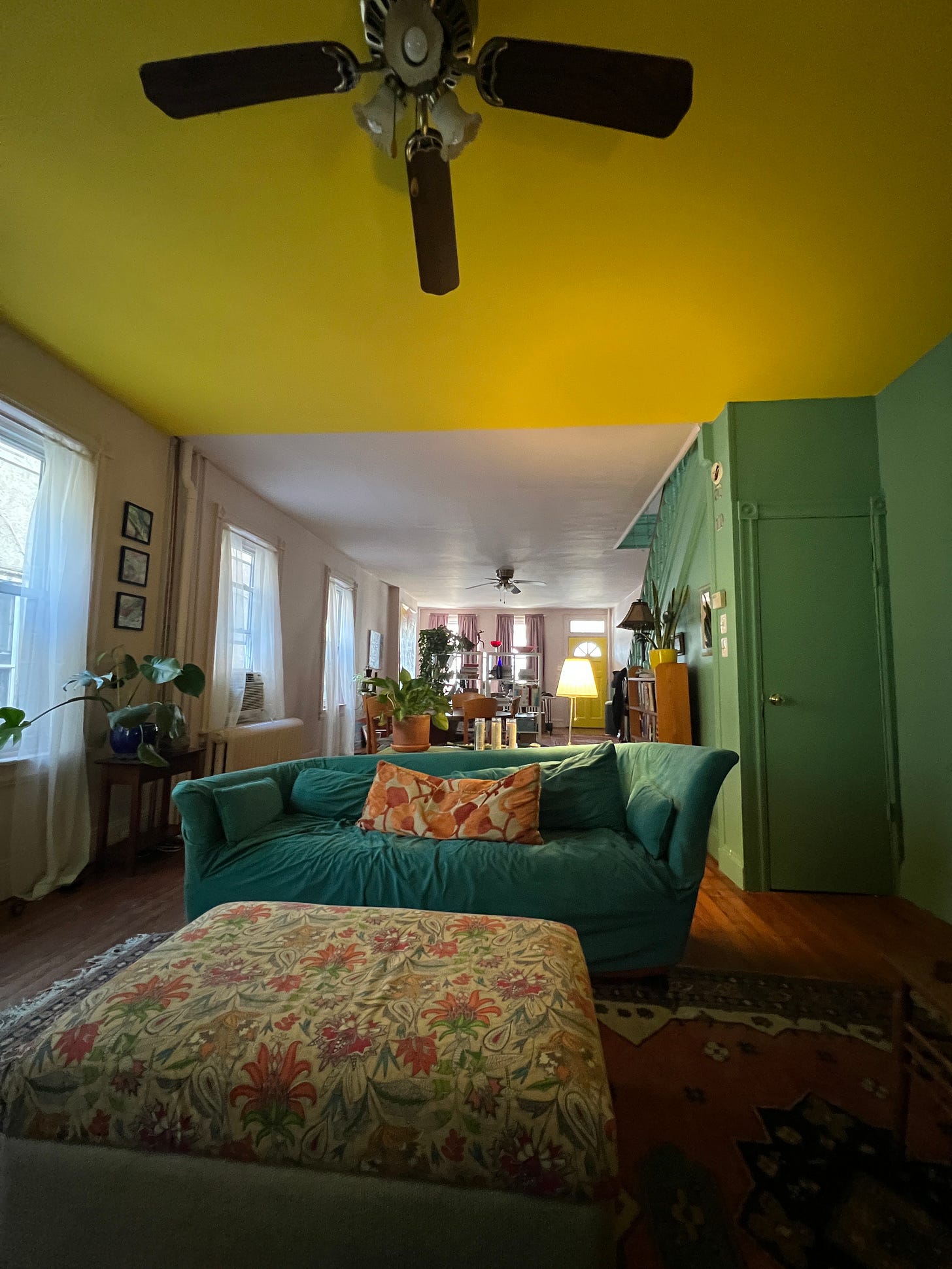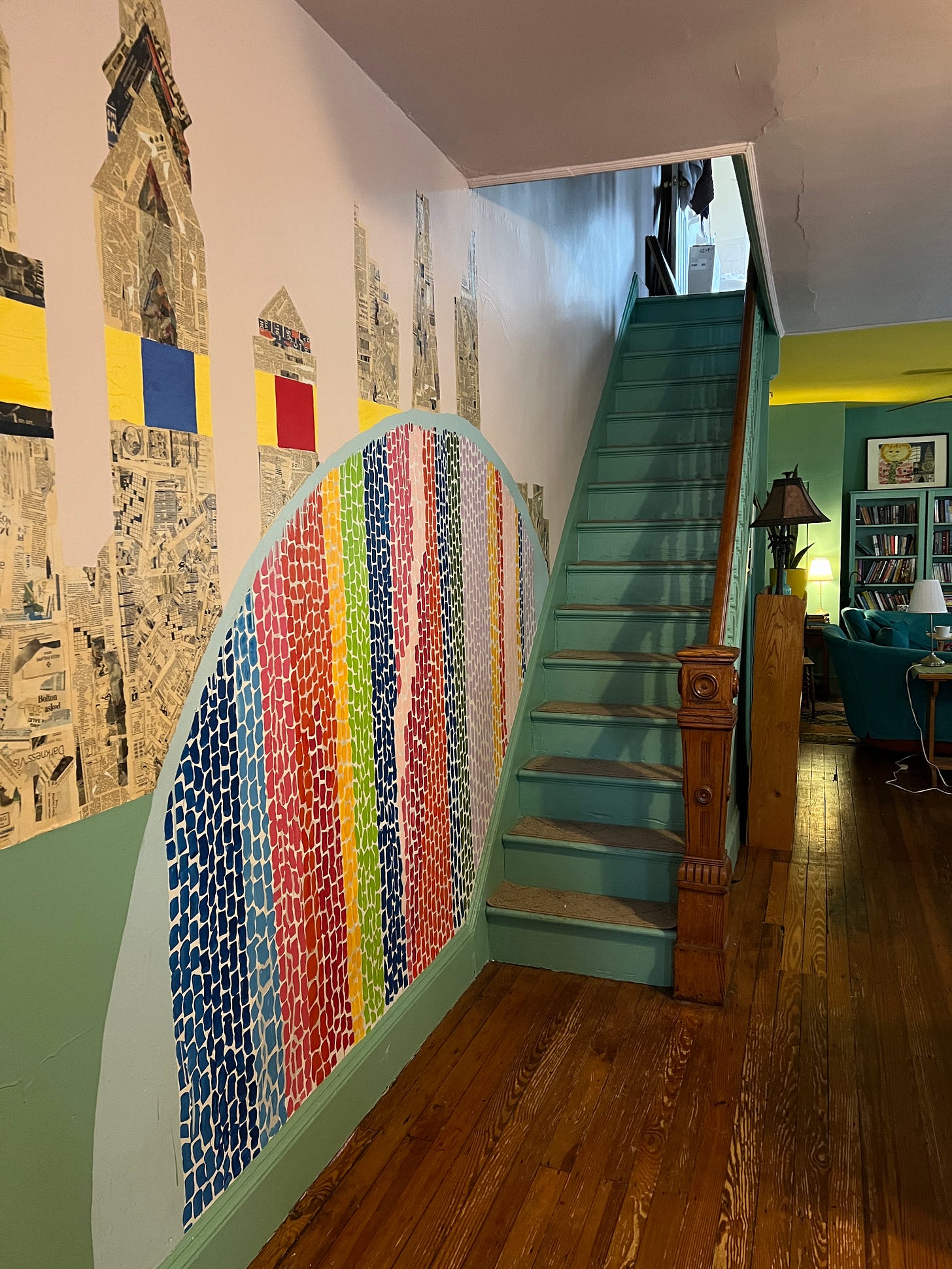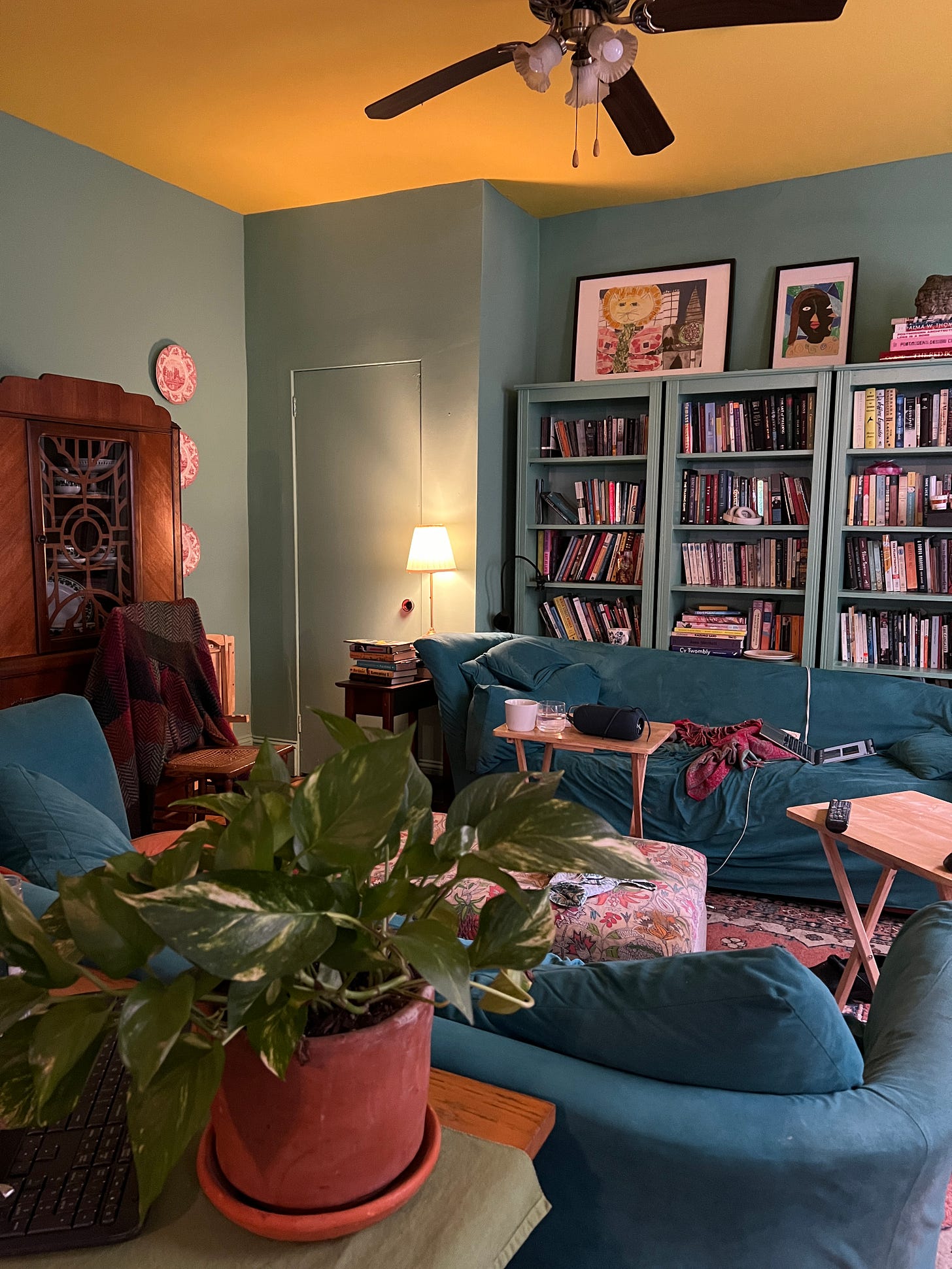"I am now [no longer] a dangerous animal": a story of coming home to my Self
plus: tickets are now on sale for "Coming Home to Ourselves: a Course for Neurodivergent Creatives" || plus plus: photos! of the home reno project! including the yellow ceiling! (iykyk)
Tickets are now on sale for the brand new course called Coming Home to Ourselves: a Course for Neurodivergent Creatives. Unmasking as neurodivergent people often (maybe necessarily?) means losing much of the sense of home we once had (even if that was only ever partial and often fraught) … but our creativity can also lead us home again in a new way. This course will be limited to 15 participants will offer a community that feels like home for people who have felt out of place, ashamed, and alienated from their creative selves. This topic is so close to my heart, and I’m really excited to be offering it with my friend Meg Max. I hope you’ll consider joining us!
Almost ten years ago, in the midst of a divorce that had turned inexplicably brutal and traumatic, I declared to my shrink that I was going to start writing about what I was experiencing. He was a pretty brilliant guy, and together we were literally saving my life. Insights were flying fast and furious, and I felt a compulsive need to share them. Other people might be going through the same thing! Maybe my story could help them!
My shrink thought this was a very bad idea. “It’s not time yet,” he said.
This was not at all what I wanted to hear.
“When will it be time?” I asked. “How soon do you think I’ll be ready to start telling my story?”
“Ten years,” he said.
This was really not what I wanted to hear.
But—spoiler alert—he was right.
The things I did write and share in those early days I have come to deeply regret. My impulse to bleed onto the page, to compulsively over-share, only ever came back to bite me in the butt. I was a raging wild animal caught in a trap, gnawing its arm off to get free … but I was the only one who saw the trap. All anyone else could see was wild-eyed rage, seemingly for no reason at all. To almost everyone I knew, I had become an unreliable narrator of my own story.
What has changed in almost ten years? It’s not so much that I have become a more reliable narrator of that terrible story, it’s that I have a whole new story now. My old story was about traumatically losing my sense of home in almost every way I had ever understood it; my new story is about finding a whole new sense of home.
I used to feel like I had a fire inside of me that I wanted to share with the world, but every time I allowed it to grow bright, it would burn everything up. I was desperate to be seen and to have my life mean something—I was so full of love and longing, but every effort at sharing what was inside of me felt fraught and dangerous.
“‘I am now a dangerous animal / The moment my hand touches you, You become darkness, unknown and remote” my shrink recited. He explained that this was the first stanza of a poem he loved, Prologue for a Flower1 by Kim Ch’un-Su.
“Yes!” I said, “that’s it! That’s exactly it.”
“I am now a dangerous animal,
The moment my hand touches you,
You become darkness, unknown and remote”
~ from Prologue to a Flower by Kim Ch’un-Su
What has changed in ten years? I no longer feel like a dangerous animal. I love darkness, but it now feels known and near. I feel at home in myself, in my space, in my work, in my community—in such a secure and cozy and content way that I could only ever have dreamed of before.
At the heart of my coming home story is also the story of becoming an artist. Or rather a story of coming to recognize myself as an artist, and building confidence and giving myself permission to explore my creativity. When I first came to understand the concept of Autistic masking it was a such an exciting revelation. I thought “unmasking” was just a matter of taking off the mask and voila! There underneath would be my “real” and “authentic” self.
Instead, what I found underneath was a very frightening sense of … nothingness. I remember sitting on my couch just staring blankly in front of me and not even being sure if I was real. It wasn’t so much, “who am I?” but more “do I even exist?” Expressing myself creatively was no longer just a nice way to spend my spare time, it was at the heart of becoming Me.
I became my own art project. Home became not just a redecorating project, but a project of re-creating my very Self.
Price, author of Unmasking Autism and its forthcoming sequel Unmasking for Life (March 2025), left this very kind comment on my last post about our new “Coming Home to Ourselves Course”:“Wow! I wish the timing had worked out for me to have read this before finalizing my next book -- one of the five core skills for unmasking that I target in the book is creativity, and the activities in this coming course sound so powerful in helping a person to attune to their creativity and learn to trust in it and practice it more regularly.”
I couldn’t have said it better myself! Some of what Meg and I envision for the course includes short presentations, in-session creative projects, and conversations that—
~create a comfortable and intimate space in which to share and work together
~look to our past and map out our creative lineages
~explore the ways we have felt like aliens and misfits in the places we have called home, and reimagine what home might mean for us
~look at the spaces where we currently create (whether that is an art studio, a desk, or a perch on the corner of your couch) and explore our own sensory and organizational needs and ways to accommodate them
~explore ways of finding and creating ecosystems and community that support and center how we want to feel in ourselves and our spaces
~explore homemaking rituals, systems, and connections that will support us as we move into the future
~receive invitations into conversations, creative making, and practical applications to welcome ourselves and each other home
I do so hope you will consider joining me and Meg for Coming Home to Ourselves: a Course for Neurodivergent Creatives. I am really passionate about this topic, and so eager to explore and go on a homecoming journey with you.
Maybe it won’t take you ten years, but if it does, it’s a journey that is worth starting any time. As my favorite author George Eliot said, “It’s never too late to be what you might have been.” I was 50 when I stepped out of my marriage, not even knowing that I was embarking on a journey to come home to myself. Next year I will be 60, and my light burns brighter than ever—but there is no longer a ring of scorched earth around me.
Just a bright yellow ceiling shining down as I write to you, dear readers!


If you have any questions about the course content, feel free to email me at marta@martarose.com. If you have questions about ticketing, payments, or any other administrative stuff, feel free to email KR, who is producing this course through their new platform, KR Presents, at krmoorhead.lit@gmail.com.
Ch’un-Su, Kim. The Snow Falling on Chagall’s Village: Selected Poems by Kim Ch’un-Su, translated by Kim Jong-Gil. Cornell University East Asia Program, 1998.






It really does take a lot of time to have enough insight to write about the past, I find -- and to do so without (as many) agendas, or without it retraumatizing you as the writer. I have shot off the hip too soon before and regretted it. And when writing about life is given enough time to ferment, I can hear the difference. It has a quality of reflection and calm even when the subject is grim. And it mostly feels good to write about the past once you have that clarity. Glad you can look that way now at such a traumatic period in your life!